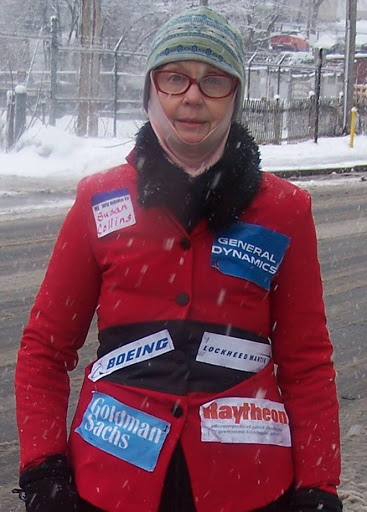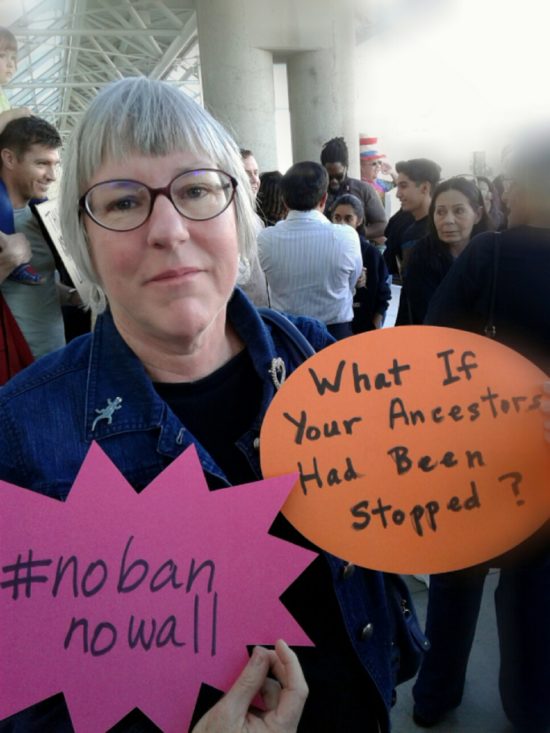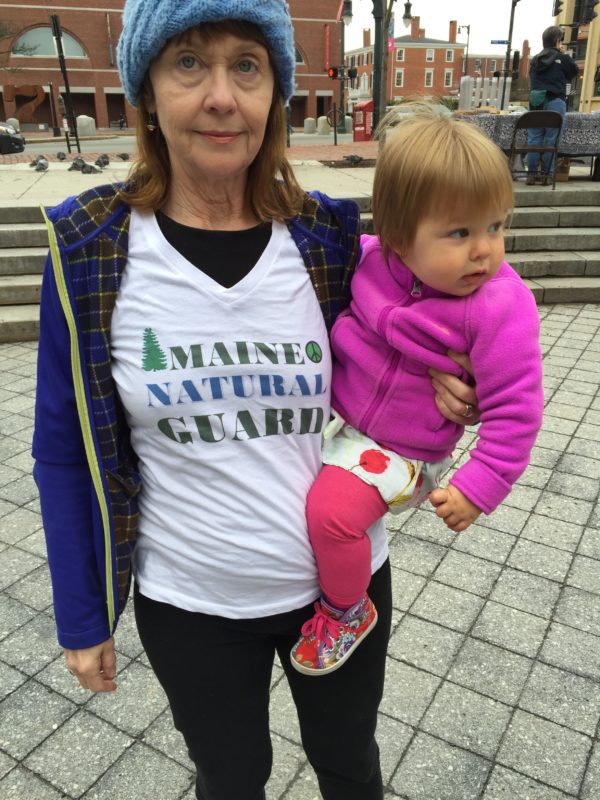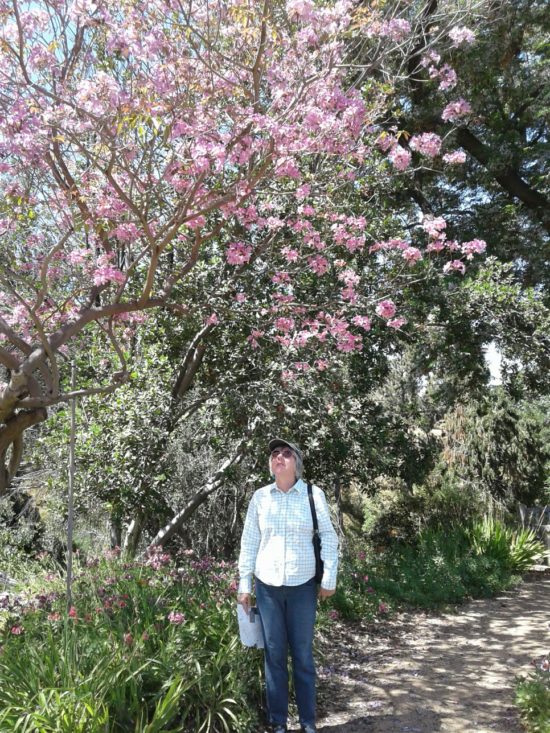As concerned Americans take on Trump’s regressive policies, there’s a new urgency afoot. We can’t afford to waste time on ill-fated resistance. A good way to sharpen our activist tools is to pay attention to what seasoned activists can teach us.
In this post, two of my favorite activists, Lisa Savage and Janet Weil, both in their 60’s, offer advice from their years of political engagement in the streets and elsewhere. (What follows are my questions with their edited responses.)
Describe a memorable action you were involved in? What did it teach you?

Lisa in a recent action, portraying Sen. Susan Collins, showcasing her corporate sponsors.
Lisa:
Anti-racist leafleting when a white supremacist group began leafleting in my area. I composed, and with others, distributed a positive message of respect for all. A woman who saw me came out of her small town diner and demanded to know what I was doing. When I showed her my literature she was relieved. She said she was afraid I was one of the white supremacists.
It taught me not to assume that people aren’t allies in the struggle, and that appearances can be deceiving.
Janet:
My most dramatic action was protesting the start of the Iraq War on March 20,2003.
As a lone, unaffiliated-at-the-time activist, I took part in a series of actions happening all over San Francisco. I was arrested with dozens of other activists after blocking traffic. . . . I was seated next to a young man who was trembling (his first action and arrest). We arrestees were handcuffed with zip ties and put on city buses . . . and detained for six hours with just two toilets for hundreds.
Thinking back over this I would say: Never go to an arrestable action without a buddy.

Janet protesting Trump’s immigration ban
What is key to effective activism?
Lisa:
Do more listening (and reading) to others’ ideas than speaking or writing. Be willing to question your assumptions and beliefs in the light of new information.
Play to your strengths. Communication is my thing where I listen to my audience to see if they are receiving what I think I am sending. Reflective practice is important (after an action). What worked, what didn’t, and what else can we try?
Don’t overlook the local media as a way to get your message out beyond the choir. It’s not hard to stand out if you do something splashy with strong visual or artistic impact, but you also can pair the creative stuff with old-fashioned press releases and telephoning news desks.
Even if only a few people attend your action, if it makes it onto the news, thousands more will receive your message.
Janet:
Be conscious of your own “savior” tendencies—whether white, male, heterosexual, economically privileged, etc. Your activism should be about working with other people to achieve certain political goals and not “saving” them.
Beware of idol worshipping, either famous leaders of the past, or current movement “stars” or major writers/speakers. Develop an independence of thought. Be curious and critical.

Janet recommends getting unplugged once a week
Once a week, stay off the Internet, social media and your phone for 24 hours. Your brain, eyes, hands and soul will thank you for it.
I consider “The End of Protest” by Micah White a must read because it highlights the work of a person of color, which is too often left out of accounts of white activists.
Study power relations; observe how change happens in the real world (and in your own mind and heart).
Act from your deepest values and don’t worry about being liked or admired.

Lisa “replenishing” with her granddaughter, Gigi
How do you replenish?
Lisa:
Plenty of rest, including recreational time with family and friends. Getting outside when possible, enjoying the arts, and being around creative people. Alone time. Yoga and meditation are key to maintaining balance and avoiding exhaustion.
I don’t need to carry the world on my shoulders. I just need to do my part.

Janet, “replenishing” in the beauty of nature
Janet:
Spending time in nature. Observing Shabbat (sometimes only for part of the day, but still.) Reading thought-provoking books or articles. I just finished reading Henry James’ political satire, “Princess Casamassima.” Exercising and resting.
I’m inspired by these words of Walt Whitman:
You shall no longer take things at second or third hand, nor look
through the eyes of the dead, nor feed on the spectres in books,
You shall not look through my eyes either, nor take things from me,
You shall listen to all sides and filter them from your self.
Lisa Savage is a peace activist and teacher in her home state of Maine. She was a lead organizer for the Bring Our War $$ Home campaign and currently is waging the Maine Natural Guard campaign to connect the dots between militarism and environmental harm. She blogs at Went2theBridge.blogspot.com.
Janet Weil has been active in anti-war/pro-peace, feminist, immigrant rights and environmental campaigns since the 1980s. A former ESL teacher, she also served on the CODEPINK national staff for several years. Janet resides with her husband in southeastern California and is currently organizing for the People’s Climate March.